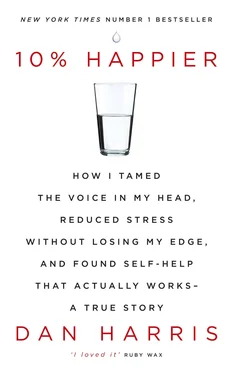After an extended run of this, the producer who’d been assigned to work with me started to grow weary of my approach. He was a young man with a pleasingly alliterative name: Wonbo Woo. Like me, he was also not an obvious choice for the faith beat. He was a secular, second-generation Korean from Boston. And, he was openly gay. Over long car rides through the Bible Belt, we had some pretty epic debates. Not about the fact that we were interviewing a lot of homophobes—Wonbo was too professional to let that deter him. What he objected to was my proclivity for pieces that revolved around conflict and caricature. He wanted me to stop acting like the Anthony Bourdain of spirituality, feeding on the most bizarre fare I could find. He was tired of the culture wars; he wanted to focus not just on people shouting about their faith but rather on how their faith affected their daily lives. In sum, he wanted to go deeper. I told him he should go work for NPR.
I was in pursuit of another of my fetishistic, look-at-what-the-wackyevangelicals-are-doing-now stories when I landed in that megachurch filled with people speaking in tongues. My crew and I had traveled to New Life Church in Colorado Springs, a complex of large buildings perched atop a hill with sweeping mountain views. We were here to see the “NORAD of prayer.” Our guide was a super-solicitous man of God by the name of Pastor Ted Haggard.
Moments after I was jarred by his noisily reverent congregant, the pastor ushered me and my team out of the main sanctuary, into the brisk Colorado air, and then into a gleaming, new, $5.5 million, fifty-five-thousand-square-foot building about a hundred yards away. We pushed through the glass doors, and walked down a long hallway decorated with religious art, the crew backpedaling in front of Ted and me, recording our conversation. Then we entered the main room, a rather astonishing space lined with enormous glass windows, at the center of which was a huge, spinning globe. It was meant to be a sort of mission control for human communication with God, outfitted with computers, and piping in news feeds from around the planet. “We’re watching the whole world all the time for events that need to be prayed for,” he told me with earnest excitement. Ted was what’s called a “prayer warrior”—someone who believes in the power of targeted, “intercessory” prayer to effect real-world changes. “If there’s any indicator that there’s a problem, we notify hundreds of thousands of intercessors immediately.”
Ted was really excited about this place—although I got the feeling he could muster equal ebullience while discussing parsnips or annuities. He did, in fact, have the air of a man who could be a top regional insurance salesman. With his short, parted hair and his sparkling eyes, he had the Clintonesque way of locking in on you and making you feel that, at least in that moment, you were the most important person in the world.
He and his wife, Gayle, had started New Life in their basement several decades earlier, with a congregation of twenty-two people. It grew with fevered intensity as Ted led his followers on a sort of siege of the city, praying outside government offices, gay bars, and the homes of suspected witches. He and his troops “prayer-walked” nearly every street in the city, and even prayed over random names in the phone book, all in an attempt to chase the Devil out of town. Undoubtedly, part of Ted’s appeal was that he had a way of invoking Satan while remaining ceaselessly chipper.
At the time of our visit, the church had fourteen thousand people on its membership rolls, and Ted was one of the leading lights in Colorado Springs, which, because it was home to many large Christian organizations, such as Campus Crusade for Christ and Focus on the Family, had come to be known as the “evangelical Vatican.” He wore his authority lightly, though, insisting that everyone simply call him “Pastor Ted.”
By now the congregants had filed out of the sanctuary, so that’s where we went to sit down and have our formal interview. As we talked, it became clear that Ted was a different breed from his fiery forebears on the Religious Right, figures like Jerry Falwell, Pat Robertson, and D. James Kennedy. He was part of a new generation of pastors who were trying to broaden the evangelical agenda beyond gay marriage and abortion. In some ways, he was more like a self-help guru. He’d written a series of books on things like making your marriage last and saving your neighbors from going to hell. He’d even published a weight loss guide, The Jerusalem Diet . To be sure, he was against abortion and homosexuality, but he didn’t go out of his way to talk about it.
After the interview, as the crew was breaking down their lights and packing up their gear, Ted sat down on the stairs leading up to the main stage and patted the step next to him. My first instinct was to make an excuse, figuring this was going to devolve into some sort of proselytizing session. But to beg off would have been rude, so I plopped down reluctantly, only to be pleasantly surprised by the conversation that ensued. With the cameras off, Ted toned down his eagerness a notch and began speaking with bracing frankness about the state of the evangelical scene in America.
“Can we talk off the record?” he asked.
“Absolutely,” I said, thinking, This could get interesting .
“There’s a huge difference between what I do as a pastor and what people like Jim Dobson do.” Dobson was the head of Focus on the Family, whose main office was right down the road and was so large it actually had its own zip code. Dobson was a pillar of old-school orthodoxy, a firebrand, and an avid critic of gays and “abortionists.”
“I have an actual congregation that I see face-to-face every week,” Ted added, “so I see what their real issues are, like their marriages, children, and finances. If I’m consistently negative, it doesn’t help them. Dobson, on the other hand, runs what’s called a ‘parachurch ministry.’ His ministry grows in the midst of controversy, because that attracts interest and funds.”
I was a little surprised to hear a big-time pastor trash-talking another major figure in Evangelicalism. It seemed a little . . . unchristian. But it was certainly intriguing, and I was starting to like this guy. He was a bit of a paradox: overfriendly and yet likable, saccharine but also capable of knowing irony. I sat there on those steps well past the point dictated by politeness, and Ted patiently answered all the questions about Evangelicalism I would have been too embarrassed to ask anyone else. He didn’t make me feel inferior for being, as they called it in evangelical lingo, “unchurched,” and he didn’t try to convert me. He was also not defensive at all when I asked how biblical literalists reconciled the fact that different books in the Bible said different things about key details in the Jesus story. He beamed mischievously and said, “We have our ways.”
Sitting there with Pastor Ted, I realized, with genuine regret, how unthinkingly judgmental I’d been—not only of Ted, but of religious people, generally. It hit me that I’d blindly bought into the prevailing stereotypes . The Washington Post had once declared these people to be “poor, uneducated and easy to command.” Pastor Ted’s story about the inner clashes of the movement put the “easy to command” notion to rest. As for my assumption about all religious people being unintelligent—Ted clearly wasn’t. Then again, neither were believers such as Tolstoy, Lincoln, and Michelangelo, not to mention contemporary people of faith like Francis Collins, the evangelical and scientist who led the charge to map the human genome.
Not only had I been unfair to people of faith by prematurely reaching sweeping, uninformed conclusions, but I’d also done myself a disservice. This beat could be more than just a chance to notch more airtime. Most people in America—and on the planet, for that matter—saw their entire lives through the lens of faith. I didn’t have to agree, but here was my chance to get under the hood and understand what was going on. More than that, I could approach faith coverage as a way to shed light instead of heat. At a time when religion had become so venomously divisive, thoughtful reporting could be a way to take audiences into worlds they’d never otherwise enter, and in the process demystify, humanize, and clarify. It was why I’d gotten into this business in the first place—to both get on TV and do meaningful work.
Читать дальше












